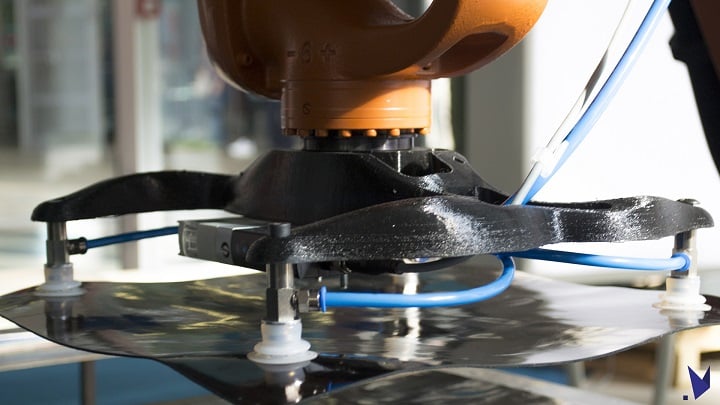![[Image: Roboze]](https://fabbaloo.com/wp-content/uploads/2020/05/Roboze-PR1428229_img_5eb0a5a1c4680.jpg)
Roboze has been focused on strength in offerings, and its latest move highlights the strength of a soft touch.
Working now with fellow Italian company Caracol Factory, a department of the larger Caracol Studio that offers additive manufacturing technologies as part of its prototyping and manufacturing services, Roboze is looking toward to continuing its work in high-performance 3D printing.
Showcasing the new collaboration, announced today, is a carbon fiber-reinforced polyamide (Carbon PA) put to use for application-specific 3D printing in handling soft materials: specifically, automated leather handling.
A component made on the Roboze One 3D printer using this material, designed and produced by Caracol Studio, highlights its capabilities. Caracol Studio describes the part as “an ad hoc customized interface flange for a specific application of handling of the leather, implemented through the synergistic work between a pneumatic gripping system and a 6-axis robot system.”
![[Image: Caracol Studio]](https://fabbaloo.com/wp-content/uploads/2020/05/caracol_img_5eb0a5a24682c.jpg)
3D printing enables the creation of strong, functional, lightweight components suited to a specific usage. Application-specific production ensures not just the right tool for the right job, but the absolute right fit within specified parameters.
Roboze touts this partnership and application as “extreme application additive manufacturing.” Leather handling, it seems, qualifies as extreme.
Finished part production is increasingly in the spotlight when it comes to additive manufacturing, and with Roboze going from strength to strength in both operations and machine functionality, the team at Caracol says the choice was clear for use of both Carbon PA and Roboze.
“We have partnered with Roboze for the supply of 3D printers because it is the only one that allows you to work the most sophisticated engineering plastics. This, together with the extraordinary mechanical solidity that characterizes the printer, offer our customers the only valid solution capable of guaranteeing repeatability and complete reliability in the manufacturing of large batches of functional components for the industry,” said Caracol Co-Founder and CEO Jacopo Gervasini.
![[Image: Roboze]](https://fabbaloo.com/wp-content/uploads/2020/05/Roboze-PR14_img_5eb0a5a2a8c1b.jpg)
Roboze, which we last saw at the industry-focused IMTS in Chicago last month, has long been proving its ability to create high-strength 3D printed parts.
This latest move from the company, one of seemingly a few we can be expecting as we come up to the always-busy formnext next month, is right in line with larger trends we’re seeing in the industry.
Use cases with real-world applications achieved with advanced manufacturing solutions allow for a look into not only what’s possible, but what’s happening today.
Caracol Studio showed off its component at the LINEAPELLE 2018 fair held last week at Rho Fiera Milano. LINEAPELLE, described as an “international exhibition of leather, accessories, components, fabrics, synthetics and models,” proved a valuable place at which to show and use the new component.
“The combination of robotics and 3D printing, with which the piece was made, has allowed us to bring industrial innovation into a sector that is still predominantly artisanal, lightening the manual work of leather handling,” Caracol Studio reports.
They continue, “This production technique has allowed the customer to receive a fully functional customized piece, designed and created specifically for the non-standard processing required, much lighter and able to increase the working speed of the robot, and therefore the overall productivity, benefiting of a component with a contemporary and captivating design.”
![[Image: Roboze]](https://fabbaloo.com/wp-content/uploads/2020/05/Roboze-PR1428329_img_5eb0a5a3029ee.jpg)
This shift — artisinal to industrial — is indicative of just what can be accomplished with the latest technologies.
Roboze is on the right track in creating high-strength solutions for the needs of industries with a long history in traditional manufacture, like leather working, as 3D printing and robotics enable a new path ahead.
Via Roboze and Caracol Studio











A manufacturing-as-a-service company has developed a way to 3D print continuous carbon fiber in a production setting.